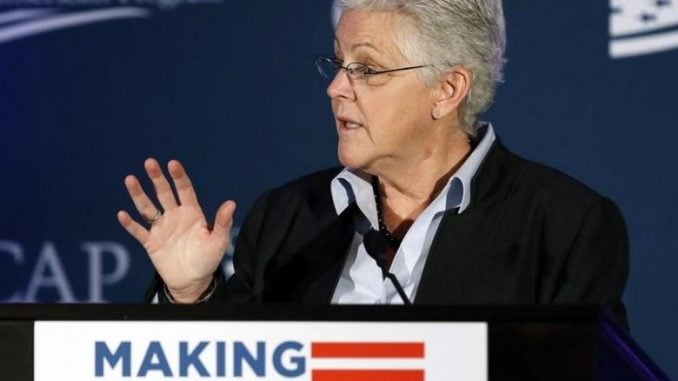
WASHINGTON, D.C. Among the millions of rural Americans who voted for incoming president Donald Trump, the U.S. Environmental Protection Agency’s legacy of hard-nosed regulation earned it a reputation as a jobs killer – a fact that outgoing EPA Director Gina McCarthy says could prove to be one of her biggest regrets. “We tried to change the outreach and messaging in rural America in a number of ways, but … has it changed the rhetoric that people hear? It hasn’t,” McCarthy said in an interview this week at EPA headquarters in Washington. “We couldn’t get it, but I wish we had.” During Barack Obama’s presidency, the agency tackled climate change with a raft of new rules targeting carbon dioxide emissions, measures McCarthy credits for spurring other countries to join a global climate agreement in Paris in December 2015. U.S. environmental policy is now set for a massive reset after Trump won November’s election on a wave of populist sentiment that was driven in part by his vow to unburden energy, mining and other industries of excess regulation. That message resonated with farming and coal mining communities grappling with job losses and stagnant economies, and helped win him a majority of the rural vote. Key parts of Obama’s environmental legacy are now in the crosshairs, including the Clean Power Plan that requires states to curb carbon output, the Waters of the United States rule that expands the number of waterways under federal protection, and U.S. participation in the global climate pact signed in Paris. In December, Trump nominated Oklahoma Attorney General Scott Pruitt, a longtime opponent of EPA regulation who has repeatedly taken the agency to court, to succeed McCarthy. “There’s no question that he will come in here with policies he wants to implement and changes he wants to make,” said McCarthy, adding she hoped that EPA career staff would temper his agenda by providing him science-based advice. She said even if major EPA rules do not survive under the new leadership, the shift Obama’s administration triggered toward lower-carbon energy would likely continue. “These are today’s technologies not yesterday’s. These are the jobs of tomorrow, not of yesterday,” she said, referring to growth in renewables technologies like solar and wind. “POLITE, SHORT CONVERSATION” McCarthy said her struggle to convince rural Americans that a clean energy economy can also provide jobs was a major disappointment in a four-year tenure that she felt was mostly positive. She said crafting the country’s first carbon regulations for power plants and taking strong enforcement actions against companies like Volkswagen – accused of cheating on emissions tests – were high points that proved the agency’s serious approach. She had tried to build more visibility and stronger partnerships in rural communities to emphasize the value of the EPA’s role, particularly in protecting local air and water. But she said political baggage around the term “climate change” had hampered those efforts. “Just because climate continues to be bandied about as a partisan issue instead of just a science issue, it’s made EPA’s job more difficult,” she said. She added coal mining communities also unfairly blamed the EPA for a downturn in the industry that began decades before the regulatory shift against carbon, and which has accelerated because of competition from natural gas. Many Republicans are opposed to efforts to combat climate change, even though an overwhelming majority of scientists say it is real and poses a threat to the planet. McCarthy said the agency’s response to the Flint water crisis, viewed by many as too slow, was one of the low points of her time as administrator but offers lessons to Pruitt. Flint, Michigan, has been at the center of a public health crisis, when tests found high amounts of lead in blood samples taken from children in the poor, predominantly black city of about 100,000 residents. “Flint and other issues really point out where there are resource limitations at the state level and why you need a federal government to support that effort and oversee it,” she said. McCarthy said she has only met her prospective successor once. That was at a D.C. Circuit Court hearing late last year on a legal challenge he and other states attorneys general had launched against the Clean Power Plan. “He seemed very polite and introduced himself and we had a polite, short conversation,” she said. She added that, after hearing the judges’ comments that seemed to lean in favor of the agency, “I think I left the building a little bit happier than he did.”



